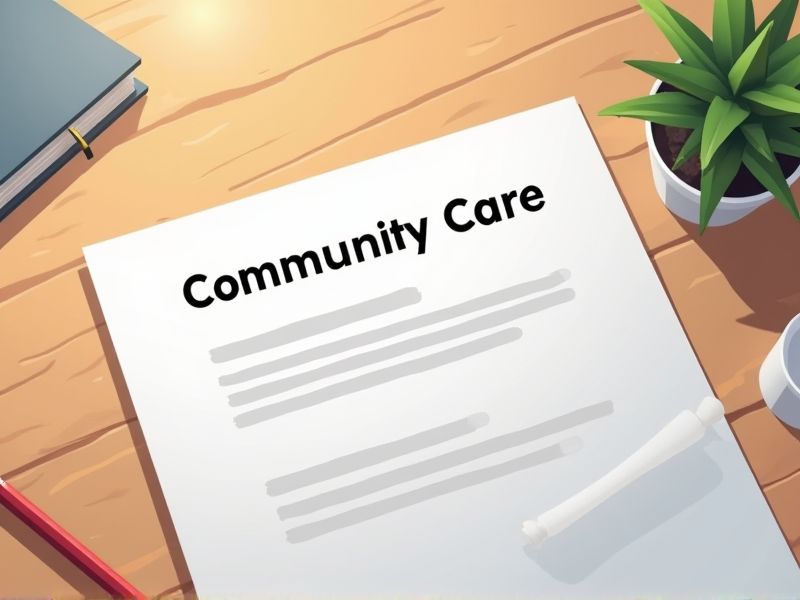
Community Care Workers play a crucial role in supporting individuals' well-being, and their responsibilities often require specialized knowledge and skills. Certifications equip these workers with the necessary expertise to effectively address the diverse needs of their clients, ensuring high-quality care. Regulatory standards in the healthcare industry frequently mandate specific certifications to uphold safety and professionalism. Below are some essential certifications you may require for a Community Care Worker position.
CPR and Basic Life Support Certification
Community care workers often encounter emergencies where CPR and Basic Life Support skills are crucial for immediate intervention. Having certification ensures they are prepared to provide life-saving assistance until professional medical help arrives. Regulatory standards and client safety protocols often require such certifications for accountability and competence. A community care worker with this certification is better equipped to maintain the trust and safety of clients in emergency situations.
First Aid Certification
First aid certification enables community care workers to effectively respond to medical emergencies, reducing potential harm to individuals requiring urgent assistance. Proper training ensures adherence to health and safety regulations, which can enhance the worker's ability to manage risks and maintain compliance. Acquiring these skills builds trust within the community, as it demonstrates a commitment to the well-being and safety of those receiving care. Certified workers are often better equipped to handle diverse situations, thereby increasing their competency and confidence in providing quality care.
Manual Handling Certification
Manual Handling Certification ensures community care workers can safely assist clients with mobility, reducing the risk of injury to both parties. Training in proper techniques decreases the likelihood of musculoskeletal disorders, which are common in this profession. Certification demonstrates compliance with health and safety regulations, protecting the care organization from potential legal issues. Knowledge of manual handling protocols improves the overall quality of care provided, as workers can focus more on their clients' well-being without safety concerns.
Infection Prevention and Control Certification
Infection Prevention and Control Certification equips community care workers with critical knowledge to reduce the spread of infections, ensuring the safety of vulnerable populations. Without proper certification, care workers may inadvertently transmit infections, causing outbreaks that can overwhelm healthcare systems. Certified care workers contribute to building public trust in community healthcare services by demonstrating expertise and commitment to patient safety. This certification supports standardization of best practices, which can lead to improved health outcomes within the community.
Safeguarding Adults Certification
Safeguarding Adults Certification equips community care workers with essential knowledge for identifying and preventing abuse or neglect among vulnerable adults. This certification ensures that workers understand legal obligations, promoting compliance with relevant laws and regulations. Acquiring this certification enhances the trust between care workers and service users by demonstrating a commitment to their safety and well-being. Without proper safeguarding training, care workers might overlook critical signs of mistreatment, leading to harmful outcomes.
Dementia Care Training Certification
Dementia Care Training Certification equips community care workers with specialized knowledge to manage the unique symptoms and behaviors associated with dementia, leading to improved patient outcomes. It fosters communication skills essential for understanding and responding to the needs of individuals with cognitive impairments, enhancing the quality of care. Certification ensures workers adhere to best practices and standards, which increases trust and confidence among families and caregivers. A certified workforce can reduce the risk of burnout by promoting effective strategies for challenging situations, contributing to long-term retention in the community care sector.
Mental Health First Aid Certification
Community care workers often encounter individuals experiencing mental health crises, and Mental Health First Aid Certification equips them with skills to respond effectively. This certification enhances their ability to recognize early signs of mental health issues, leading to timely intervention. Proper training reduces the stigma surrounding mental health, fostering a more supportive community environment. Additionally, it prepares care workers to offer appropriate guidance and resources, improving overall mental health outcomes for those in their care.
Care Certificate for Health and Social Care
The Care Certificate establishes a standardized baseline of essential skills and knowledge for community care workers, ensuring consistent quality of care. It enhances safety by ensuring workers are well-trained in key areas like safe handling, infection prevention, and communication. Employers benefit by having a workforce that meets regulatory standards, reducing the risk of non-compliance penalties. The Care Certificate boosts workforce confidence, leading to improved job satisfaction and reduced staff turnover in health and social care settings.
Communication Skills for Healthcare Professionals Certification
The Communication Skills for Healthcare Professionals Certification equips community care workers with essential techniques for effectively conveying information to patients and families, leading to improved patient understanding and compliance. Research shows patients with clear guidance experience better health outcomes, reducing the likelihood of repeat visits and unnecessary complications. Miscommunication can contribute to medical errors; thus, certified workers are better prepared to avoid such errors, enhancing overall patient safety. Furthermore, possessing strong communication skills fosters trust and rapport with patients, which plays a crucial role in patient satisfaction and retention.
Medication Administration Certification
Medication Administration Certification ensures that community care workers are equipped with the necessary knowledge and skills to safely administer medications, reducing the risk of errors that could harm patients. State regulations often require this certification to maintain safety and compliance in healthcare settings. Certified workers enhance the trust and confidence of patients and their families, knowing the care provided meets standardized protocols. Organizations with certified staff tend to experience better health outcomes and fewer legal liabilities related to medication errors.
Summary
When you, as a reader, understand the impact of certifications for Community Care Workers, you recognize the potential for improved care quality. Certifications often lead to enhanced skills and increased professional credibility. This can result in higher trust from clients and better job opportunities. The community benefits from more competent and reliable care services.
